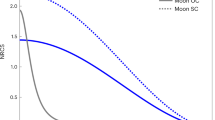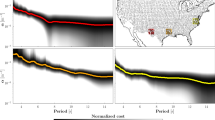Abstract
INCIDENTAL to radar studies of the aurora at Saskatoon, Canada (52.l°N., and 106.6° W.), with frequencies of 56 and 106.5 Mc./s., a persistent scatter echo is observed with the lower frequency. This echo arises apparently from the lower ionosphere. As viewed on a conventional range-amplitude display, the scattered signals appear extremely diffuse, but are quite evident on photographs of the display with exposures of a minute or more. A similar type of echo has never been detected at the higher frequency, although both radar units have about the same sensitivity and scan simultaneously the same parts of the sky.
This is a preview of subscription content, access via your institution
Access options
Subscribe to this journal
Receive 51 print issues and online access
$199.00 per year
only $3.90 per issue
Buy this article
- Purchase on Springer Link
- Instant access to full article PDF
Prices may be subject to local taxes which are calculated during checkout
Similar content being viewed by others
References
Bailey, D. K., Bateman, R., Berkner, L. V., Booker, H. G., Montgomery, G. F., Purcell, E. M., Salisbury, W. W., and Wiesner, J. B., Phys. Rev., 86, 141 (1952).
Author information
Authors and Affiliations
Rights and permissions
About this article
Cite this article
FORSYTH, P., CURRIE, B. & VAWTER, F. Scattering of 56-Mc./s. Radio Waves from the Lower Ionosphere. Nature 171, 352–353 (1953). https://doi.org/10.1038/171352a0
Issue Date:
DOI: https://doi.org/10.1038/171352a0
Comments
By submitting a comment you agree to abide by our Terms and Community Guidelines. If you find something abusive or that does not comply with our terms or guidelines please flag it as inappropriate.



